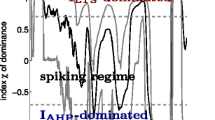Abstract
We present a method for the reconstruction of three stimulus-evoked time-varying synaptic input conductances from voltage recordings. Our approach is based on exploiting the stochastic nature of synaptic conductances and membrane voltage. Starting with the assumption that the variances of the conductances are known, we use a stochastic differential equation to model dynamics of membrane potential and derive equations for first and second moments that can be solved to find conductances. We successfully apply the new reconstruction method to simulated data. We also explore the robustness of the method as the assumptions of the underlying model are relaxed. We vary the noise levels, the reversal potentials, the number of stimulus repetitions, and the accuracy of conductance variance estimation to quantify the robustness of reconstruction. These studies pave the way for the application of the method to experimental data.




Similar content being viewed by others
References
Agmon-Snir, H., Carr, C. E., & Rinzel, J. (1998). A case study for dendritic function: Improving the performance of auditory coincidence detectors. Nature, 393, 268–272.
Anderson, J. S., Carandini, M., & Ferster, D. (2000). Orientation tuning of input conductance, excitation, and inhibition in cat primary visual cortex. Journal of Neurophysiology, 84, 909–926.
Borg-Graham, L., Monier, C., & Frégnac, Y. (1996). Voltage-clamp measurement of visually-evoked conductances with whole-cell patch recordings in primary visual cortex. Journal of Physiology - Paris, 90(3–4), 185–188.
Borg-Graham, L. J., Monier, C., & Frégnac, Y. (1998). Visual input evokes transient and strong shunting inhibition in visual cortical neurons. Nature, 393, 369–373.
Chavas, J., & Marty, A. (2003). Coexistence of excitatory and inhibitory GABA synapses in the cerebellar interneuron network. Journal of Neuroscience, 23(6), 2019–2031.
Cruikshank, S., Lewis, T. J., & Connors, B. W. (2007). Synaptic basis for intense thalamocortical activation of feedforward inhibitory cells in neocortex. Nature Neuroscience, 10, 400–402.
DeFazio, R. A., Heger, S., Ojeda, S. R. , & Moenter, S. M. (2002). Activation of A-type gamma-aminobutyric acid receptors excites gonadotropin-releasing hormone neurons. Molecular Endocrinology, 16, 2872–2891.
Edwards, C. J., Alder, T. B., & Rose, G. J. (2005). Pulse rise time but not duty cycle affects the temporal selectivity of neurons in the anuran midbrain that prefer slow AM rates. Journal of Neurophysiology, 93, 1336–1341.
Edwards, C. J., Leary, C. J., & Rose, G. J. (2008). Mechanisms of long-interval selectivity in midbrain auditory neurons: Roles of excitation, inhibition and plasticity. Journal of Neurophysiology, 100, 3407–3416.
Gittelman, J. X., Li, N., & Pollak, G. D. (2009). Mechanisms underlying directional selectivity for frequency-modulated sweeps in the inferior colliculus revealed by in vivo whole-cell recordings. Journal of Neuroscience, 29(41), 13030–13041.
Kim, Y., & Trussell, L. O. (2009). Negative shift in the glycine reversal potential mediated by a Ca2+- and pH- dependent mechanism in interneurons. Journal of Neuroscience, 29(37), 11495–11510.
Leary, C. J., Edwards, C. J., & Rose, G. J. (2008). Midbrain auditory neurons integrate excitation and inhibition to generate duration selectivity: An in vivo whole-cell patch study in anurans. Journal of Neuroscience, 28, 5481–5493.
Lindner, B., & Longtin, A. (2006). Comment on: Characterization of subthreshold voltage fluctuations in neuronal membranes by M. Rudolph and A. Destexhe. Neural Computation, 18, 1896.
Monier, C., Fournier, J., & Frégnac, Y. (2008). In vitro and in vivo measures of evoked excitatory and inhibitory conductance dynamics in sensory cortices. Journal of Neuroscience Methods, 169(2), 323–365.
Paninski, L., Vidne, M., Depasquale, B., & Ferreira, D. G. (2011). Inferring synaptic inputs given a noisy voltage trace via sequential Monte Carlo methods. doi:10.1007/s10827-011-0371-7.
Pospischil, M., Piwkowska, Z., Rudolph, M., Bal, T., & Destexhe, A. (2007). Calculating event-triggered average synaptic conductances from the membrane potential. Journal of Neurophysiology, 97, 25445–2552.
Priebe, N. J., & Ferster, D. (2005). Direction selectivity of excitation and inhibition in simple cells of the cat primary visual cortex. Neuron, 45(1), 133–45.
Richardson, M. J. E., & Gerstner, W. (2005). Synaptic shot noise and conductance fluctuations affect the membrane voltage with equal significance. Neural Computation, 17, 923–947.
Rudolph, M., & Destexhe, A. (2005). An extended analytic expression for the membrane potential distribution of conductance-based synaptic noise. Neural Computation, 17, 2301–2315.
Rudolph, M., & Destexhe, A. (2006). On the use of analytical expressions for the voltage distribution to analyze intracellular recordings. Neural Computation, 18, 2917–2922.
Rudolph, M., Pelletier, J. G. , Pare, D., & Destexhe, A. (2005). Characterization of synaptic conductances and integrative properties during electrically induced EEG-activated states in neocortical neurons in vivo. Journal of Neurophysiology, 94, 2805–2821.
Rudolph, M., Piwkowska, Z., Badoual, M., Bal, T., & Destexhe, A. (2004). A method to estimate synaptic conductances from membrane potential fluctuations. Journal of Neurophysiology, 91, 2884–2896.
Rudolph, M., Pospischil, M., Timofeev, I., & Destexhe, A. (2007). Inhibition determines membrane potential dynamics and controls action potential generation in awake and sleeping cat cortex. Journal of Neuroscience, 27, 5280–5290.
Tan, A. Y., Zhang, L. I., Merzenich, M. M., & Schreiner, C. E. (2004). Tone-evoked excitatory and inhibitory synaptic conductances of primary auditory cortex neurons. Journal of Neurophysiology, 92, 630–643.
Wehr, M., & Zador, A. M. (2003). Balanced inhibition underlies tuning and sharpens spike timing in auditory cortex. Nature, 426 442–446.
Wehr, M. S., & Zador, A. (2005). Synaptic mechanisms of forward suppression in rat auditory cortex. Neuron, 47, 325–327.
Wilkerson, J. J., Vasquez-Opazo, G. A., & Rose, G. J. (2010). The role of GABA-A receptor-mediated inhibition in shaping the duration selectivity of IC neurons in anurans. Program No. 104.5. 2010 Neuroscience Meeting Planner. San Diego, CA: Society for Neuroscience (online).
Acknowledgements
This work was supported by National Science Foundation grants NSF-DMS-1022945 and NSF-0354259. The authors also would like to thank Gary Rose and Jeremy Wilkerson for stimulating discussions.
Author information
Authors and Affiliations
Corresponding author
Additional information
Action Editor: Frances K. Skinner
Electronic Supplementary Material
Below is the link to the electronic supplementary material.
Rights and permissions
About this article
Cite this article
Odom, S.E., Borisyuk, A. Estimating three synaptic conductances in a stochastic neural model. J Comput Neurosci 33, 191–205 (2012). https://doi.org/10.1007/s10827-012-0382-z
Received:
Revised:
Accepted:
Published:
Issue Date:
DOI: https://doi.org/10.1007/s10827-012-0382-z




